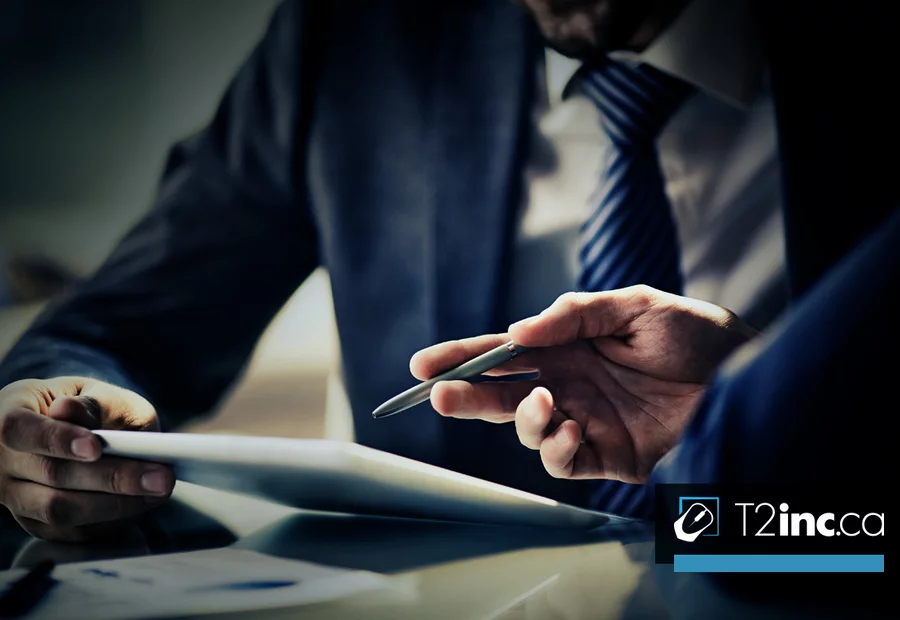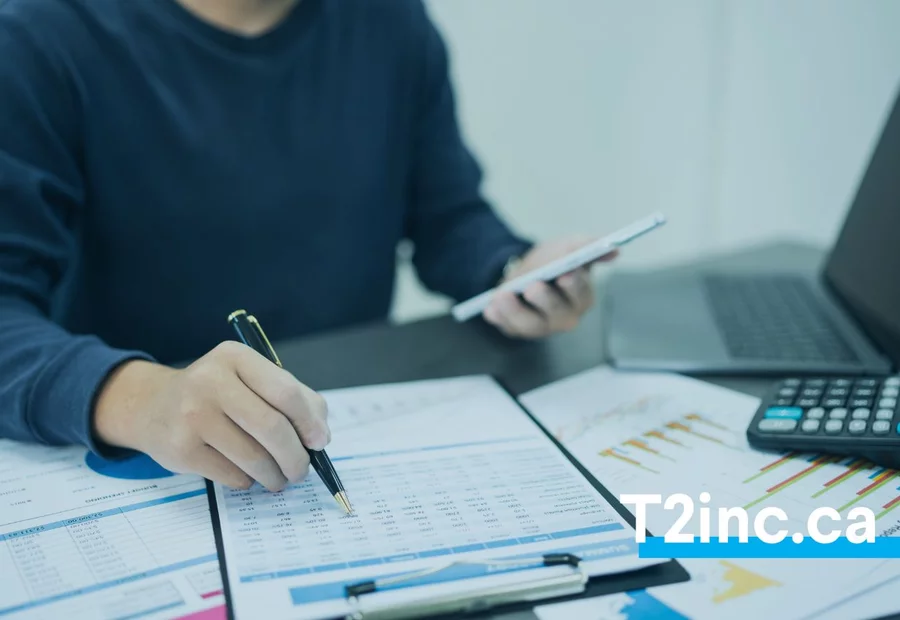Tax Audits: How to Be Prepared

A corporate tax audit can be stressful and complicated. It is important to understand the audit process and what your business rights and obligations are. In Canada and in Quebec, tax audits are conducted by the Canada Revenue Agency and Revenu Québec respectively.
T2inc explains the tax audit process for businesses in Canada and Quebec. Learn about corporate rights and obligations, as well as what steps to take in case of an audit.
Business tax audits in Canada and Quebec
In Canada, the Canada Revenue Agency (CRA) will conduct a tax audit to confirm that a business is obeying tax laws and regulations. Tax audits can be conducted at any time, either in person or by mail. The CRA relies on a variety of methods when selecting which businesses to audit, including data analysis and information provided by other businesses or via whistleblowers.
In Quebec, Revenu Québec also has the authority to conduct tax audits. Like the CRA, Revenu Québec selects business to audit using a variety of means.
The tax audit process
Once a company is selected for a tax audit, the CRA or Revenu Québec contacts the company to inform them of the upcoming audit. At this point, the company must provide all necessary information and documents. The CRA or Revenu Québec will review these documents to verify whether the company is obeying tax laws and respecting provincial and federal regulations.
If errors are detected during the tax audit, the CRA or Revenu Quebec may ask the company to pay taxes owed and penalties. In some serious cases, the company may be subject to criminal prosecution.
It is important to note that audited businesses have rights and obligations when they are subject to a tax audit, which will be discussed later in this article.
What are the grounds for a tax audit?
According to an article in the reputable Forbes Magazine, these are the most common reasons why the CRA might choose to shine a spotlight on your tax file.
<H3> Giving very generously to charities
Businesses that donate large amounts of money to charities and then request tax receipts must ensure that they follow the rules. A poorly completed form will attract suspicion from the Canada Revenue Agency.
Omitting certain income on your tax return
With the technology and artificial intelligence available today, Revenue Agency computers can detect anomalies in any company's income statement. It’s essential to file your Canadian corporate tax return in a consistent and transparent manner.
Owning a company that reports several consecutive deficits
If (during their audit) CRA officials find that your small business has suffered consecutive deficits, the legality and tax legitimacy of your business may be called into question.
Using a tax expert with a questionable history
Your colleague's friend's cousin charges almost nothing to do your taxes. What you don't know is that, a few years ago, he found himself under the microscope of the CRA for irregularities in his reporting. Using a tax expert with a dubious reputation will arouse suspicion. It is essential to know who you are entrusting to draft your tax return. Take the time to find a reliable and competent accountant. Remember that you, and not your accountant, will be the target of a tax audit!
Declaring amounts that are too well-rounded
It is unlikely that your business income and expenses will consistently be even numbers, such as $10,000, $55,500 or $1,000,000! Auditors may choose to take a close look at your tax situation when they see that your financial calculations do not include cents.
The rights and obligations of companies during a tax audit
Businesses have rights and obligations when they find themselves subjected to a tax audit. The following are the primary rights and obligations a business should know about:
Corporate rights
- The right to be informed: A business has the right to be informed of the nature and scope of a tax audit and any related rights and obligations.
- The right to ask questions: The company has the right to ask the tax inspector questions during the audit with the goal of clarifying the auditor's requests.
- The right to be represented: The business has the right to be represented by a lawyer or a chartered accountant during the tax audit.
- The right to confidentiality: The company has the right to have its information protected by law, including information that has been given to the tax inspector.
Corporate obligations
- The obligation to provide documents: The company must provide all documents requested by the tax inspector within a reasonable time.
- The obligation to cooperate: The company must cooperate with the auditor during the tax audit.
- The obligation to declare all income: The company must declare all income, including income from foreign sources.
- The obligation to pay taxes due: If errors are detected during a tax audit, the company must pay any taxes and penalties due.
It is important for companies to know their rights and obligations when they are subject to a tax audit. A company must cooperate with a tax inspector while protecting their own rights. If the company suspects that its rights have been violated, they should contact an accountant or lawyer for assistance.
Different types of corporate tax audits
In Canada and Quebec, there are several types of business tax audits. These can be initiated randomly or in response to anomalies or errors in a company's tax returns. The following are some of the most common types of tax audits:
- Compliance audit: This type of audit determines whether a business is complying with tax rules and legal requirements for bookkeeping and accounting.
- Correspondence audit: In a correspondence audit, the CRA or RQ asks the company to provide documentary evidence to support the amounts declared in its tax returns.
- In-depth audit: This is a more in-depth audit than the correspondence audit and can cover all aspects of a company's accounting. Auditors can request documentary evidence, details of transactions and even site visits.
- Cash audit: This audit focuses on a company's cash and bank deposits. Auditors may ask the business to justify the source of funds and their use.
It is important to note that this is not an exhaustive list. The CRA may conduct customized tax audits based on individual business circumstances.
How to prepare your business for a tax audit
It's important to prepare carefully for a corporate tax audit to minimize the risk of errors or omissions that could result in penalties and fines. Here are some points to help you prepare for a business tax audit:
1. Organize your documents
The first step is to organize your company's financial and accounting records. This includes gathering all bookkeeping records, financial statements, tax returns, invoices, contracts, bank statements and payment receipts. Documents should be sorted by year, type of transaction and account so that you can easily find and present them to auditors.
2. Verify the accuracy of tax returns
Verify the accuracy of company tax returns before the auditor arrives. We recommend conducting a mock audit to identify any errors and inconsistencies and correct them before the audit begins.
3. Avoid providing unnecessary information
It is important to provide only the information requested by the auditor. They may ask for additional information or clarification, but it is not necessary to provide unnecessary information that could be detrimental to your business.
4. Train employees
We also recommend training your employees regarding tax rules and accounting requirements. They should be informed of what procedures to follow in case of a tax audit and how to respond to the auditor's requests.
5. Ask for help from an accountant
If a company finds it difficult to respond to an auditor's requests, ask for help from a tax accountant. At T2inc.ca, we provide personalized advice and help you prepare business documentation for your tax audit.
What to do after a tax audit
Once a tax audit is complete, you may need to take steps to make sure your business is complying with laws and regulations, to avoid similar problems in the future. Important steps to take after a business tax audit include:
Review the audit report
After a tax audit, the auditor usually submits a report describing their findings and recommendations. It is important to review these and make any necessary changes, to avoid future audits and to ensure that your business is following current tax rules.
Establish internal controls
Internal controls are processes that a company puts in place to ensure that financial transactions are accurate and reliable. After a tax audit, it is recommended that effective internal controls be put in place to avoid future problems.
Get tax advice from a professional
If the business has questions or concerns about tax rules, it may be helpful to seek professional tax advice. A good accountant can help ensure that your business is in compliance with tax laws and can provide advice on avoiding tax problems.
Get help to avoid a tax audit
In short, a tax audit can be a stressful and time-consuming experience for business owners. However, it is ‘business as usual’ for tax authorities. Preparing properly and having accurate tax documents can help minimize stress and negative financial repercussions.
At T2inc.ca, we understand the importance of corporate tax compliance. As chartered accountants and business tax specialists, we have extensive experience in preparing business tax returns.
Contact us with any questions or for assistance with a tax audit. We are here to help you keep your business on track.
Contact our experts
Have a question? Need help? Fill out our online form to get help from our experts.
Contact usNeed more help?
Contact us by filling out our form
Are you interested in our services, but would like more information before taking the plunge? Contact us today and one of our tax accountants will be in touch to help you.
At T2inc.ca, we're committed to helping business owners manage their company's tax affairs so they can grow their business.




